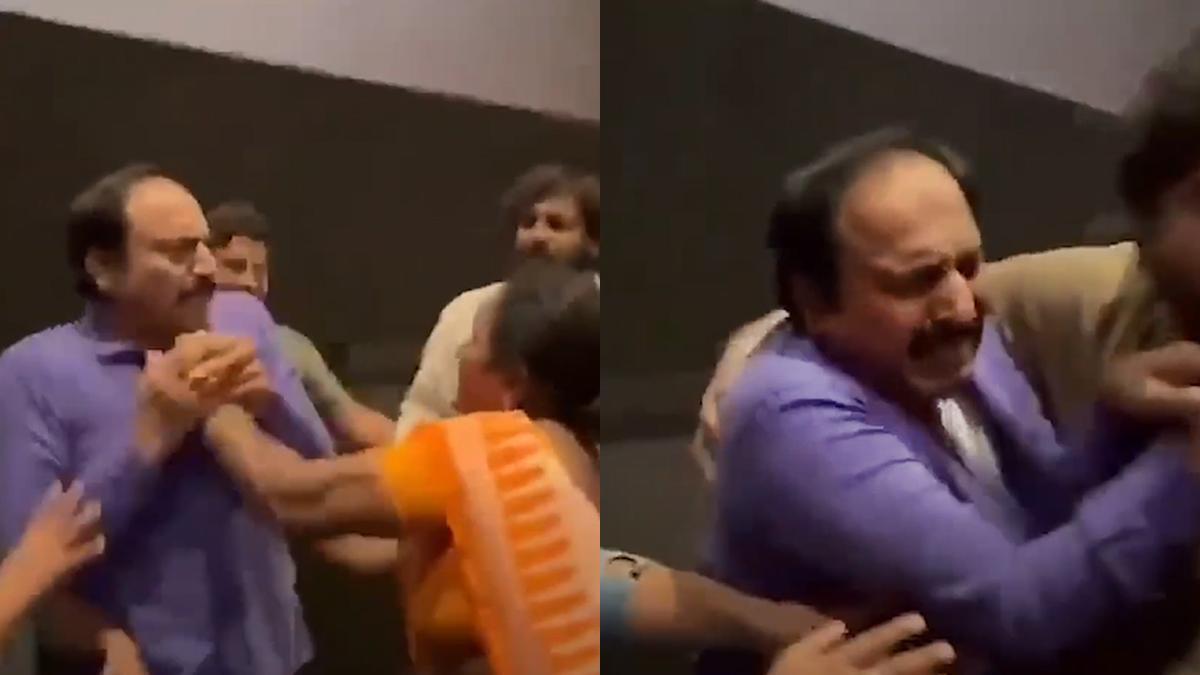
In an extraordinary incident at a local cinema in India, popular Telugu actor NT Ramaswamy found himself at the center of unexpected controversy during the screening of his latest film, ‘Love Reddy.’ The film, released recently, showcases Ramaswamy in a starkly negative role, casting a shadow over the onscreen romantic narrative portrayed by lead actors Anjan Ramachendra and Sharvani Krishnaveni. This narrative twist seems to resonate profoundly with the audience, albeit not always positively.
The dramatic event unfolded during a lively interaction session with the film’s cast and crew post-screening. What was meant to be a routine engagement swiftly spiraled into chaos. A woman, seemingly incensed by Ramaswamy’s onscreen persona, abruptly approached him, and with a fervor that shocked both the actor and the audience, slapped him across the face. She further expressed her outrage by grabbing his collar and vocally denouncing the villainous character he portrayed.
This act of aggression, captured on several smartphones, quickly became a trending topic across social media platforms. The viral footage sparked widespread debate, touching on fan culture, the psychological impact of fictional narratives, and the responsibility of actors in portraying negative roles. The incident has been a hot topic in news outlets, adding a layer of real-world drama to the already intense narrative of ‘Love Reddy.’
The contentious film, directed by Smaran Reddy, is set in a rustic backdrop, contrasting pastoral simplicity with emotional complexity. It hit theaters on October 18, 2024, and has since stirred quite a bit of discourse, primarily due to Ramaswamy’s character. His portrayal of a man consumed by jealousy and violence was intended to add depth and tension to the storyline. Instead, it has sparked a debate about separating art from reality.
.
One particular scene in the film, showing Ramaswamy’s character engaging in self-harm with a stone, seems to have left a lasting impression on certain audience members, possibly contributing to the emotional outburst that followed the screening. Interestingly, the very intensity that the filmmakers intended to convey seems to have touched a raw nerve.
As the incident unfolded, the rest of the film’s team along with the cinema’s management, took swift action to defuse the situation. Ramaswamy, though visibly shaken by the unexpected turn of events, maintained his composure and later spoke to the media, emphasizing the fictional nature of his onscreen role. “It’s essential for viewers to understand that actors bring characters to life, but those characters do not define us,” he commented, also expressing concern for fans who might be strongly affected by cinematic portrayals.
Industry experts, psychologists, and fellow actors have weighed in on the incident, discussing the psychological lines that often blur in the minds of passionate fans. The case has prompted a discussion on potential measures to help audiences better distinguish between fiction and reality, especially in emotionally charged cinematic experiences.
‘Love Reddy,’ distinct for its rural romantic theme and dramatic tension, continues to draw audiences despite the controversy. Film analysts argue that such incidents, while unfortunate, underline the power of cinema to evoke deep and visceral reactions, serving as a testament to its impact albeit in unintended ways.
Meanwhile, the uproar over the public assault has led to increased security measures at subsequent film events involving Ramaswamy, with organizers keen to avoid repetitions of similar incidents. In light of this, cinema halls across the region are revisiting their security protocols to ensure safe and enjoyable experiences for both creators and audiences alike.
As discussions continue in media circles and public forums, the incident serves as a stark reminder of the complex interplay between actors, their roles, and audience perceptions. For NT Ramaswamy, it is a momentary pause in what remains a distinguished career, as he and the team of ‘Love Reddy’ brace themselves for the road ahead, hopeful that time will allow for a clearer understanding and appreciation of their artistic endeavors.












